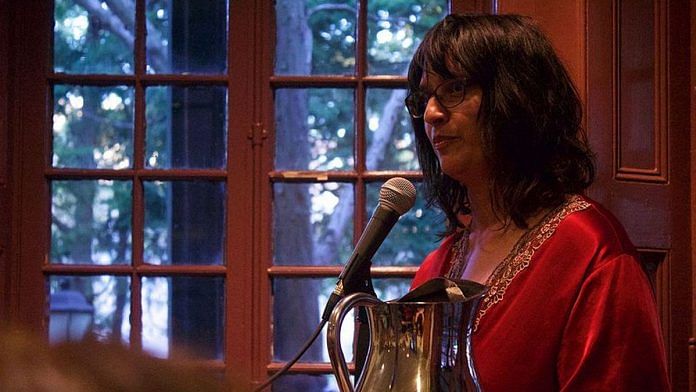
New Delhi: Bhanu Kapil has become the first Indian-origin poet to win the coveted T.S. Eliot Prize for Poetry in the UK for her collection How to Wash a Heart. The judges have called her collection “radical and arresting” and one that “recalibrates what it’s possible for poetry to achieve”.
Kapil’s poems look at the complex dynamics between an immigrant and her white, middle-class host. The compilation, her first full length collection published in Britain, asks difficult questions about the limits of inclusion, care and hospitality. She also uses poetry as a mode of interrogation.
Born to Indian parents in London in 1968, Kapil did her B.A. from England’s Loughborough University and after that pursued a Masters in English Literature from the SUNY Brockport in the US. Kapil has cited Salman Rushdie as an early influence in her writing career.
She has written six books of poetry/prose, and the first was published in 2001. She was also awarded the Windham Campbell Prize for Poetry in 2020.
The T.S. Eliot Prize for Poetry was inaugurated in 1993 to celebrate the Poetry Book Society’s 40th birthday. The Poetry Book Society was founded by Eliot and his friends in 1953.
The prize is awarded every year to the author of the best collection of poetry published in the UK and Ireland. The Guardian has called it “most valuable award in British poetry”.
Found inspiration in a newspaper photograph
Kapil has said that inspiration for How to Wash a Heart was a newspaper photograph of a couple in California who had welcomed a guest “with a precarious visa status”.
In an earlier interview, she had also said, “What caught my attention was the tautness of the muscles around the mouths of these hosts. Perhaps they were simply nervous of being photographed. Nevertheless, the soft tissue contraction of those particular muscles are at odds (when visible) to a smile itself.”
Parts of a poem in How to Wash a Heart (which was published in March 2020) read: “As your guest, I trained myself / To beautify / Our collective trauma.”
It also notes: “I understood that you were a wolf / Capable of devouring / My internal organs / If I exposed them to view.”
The judges for this year’s T.S. Eliot Prize — Lavinia Greenlaw (chair), Mona Arshi and Andrew McMillan — have said that Kapil’s work was chosen unanimously by the panel.
Winner of the T.S. Eliot Prize for Poetry this year will receive a prize money of £25,000.
Subscribe to our channels on YouTube & Telegram
Why news media is in crisis & How you can fix it
India needs free, fair, non-hyphenated and questioning journalism even more as it faces multiple crises.
But the news media is in a crisis of its own. There have been brutal layoffs and pay-cuts. The best of journalism is shrinking, yielding to crude prime-time spectacle.
ThePrint has the finest young reporters, columnists and editors working for it. Sustaining journalism of this quality needs smart and thinking people like you to pay for it. Whether you live in India or overseas, you can do it here.